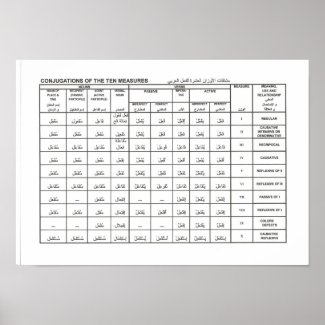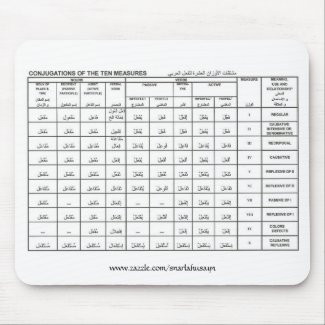Adventures in Language
Random musings of a lifelong language learner
Tuesday, December 13, 2011
Romanian Progress
I'll keep you posted.
Thursday, December 8, 2011
A New Language Goal
I'm a member of the Coast Guard Auxiliary and the Auxiliary has an Interpreter Corps that supports the U.S. Coast Guard. Maybe my Romanian's good enough right now to pass their tests. I don't know. But I don't want to leave anything to chance. I'm taking another large course with the Coast Guard in January which will have me driving some long hours back and forth, during which time I will be listening to my Romanian dialogues. I will also now move in the direction of speaking only Romanian at home with my Romanian wife.
I'll make regular updates on this blog about the progress of my attempt.
Saturday, August 13, 2011
Mastering the Arabic Forms/Measures
Setting aside the question of the irregular verbs, even the most regular of letters can have up to ten different forms in which to appear.
As a handy reference, here is a presentation the 10 main Arabic Verb Forms. (There are a few extremely rare and now archaic and unused Forms beyond the 10. Don't worry about those.)
While you're just getting started in Arabic, it's important to have a clear chart of the Arabic Verb Forms readily on hand to consult while you're needing to look things up in your dictionary.
The best one I've seen for casual learning purposes are available for sale on the internet by one Snarla Husayn.
She has her chart of Arabic Verb Forms available in the form of a mousepad:
A wall poster:

conjugations of the ten measures by SnarlaHusayn
sell your artwork online using Zazzle.
And even a t-shirt with the Arabic Verb Forms!:
As long as you're buying nifty Arabic learning materials, check out Snarla Husayn's Store at Zazzle, where she has, among other things--
Shaykh Zubayr (get it, Shakespeare in a kafiyah!):
Anyway, what I found while learning Arabic is that the more I surrounded myself with the language constantly, the greater progress I made. And products like these really can help make the language come alive.
Sunday, March 6, 2011
A Great Idea That Deserves Help
http://52languages.blogspot.com/2011/03/appeal-to-language-enthusiasts.html
I just voted for the idea. It's a great way to support language learning to a new generation.
Thursday, December 30, 2010
It's All About Vocab
Well? What is this person trying to say? They always assume, correctly, that the answer is "I want to drink water."
And that's why I stress vocabulary over grammar as the primary place to direct your efforts when trying to learn a new language.
The free word lists I give away on my websites are a tool I've used, but there are some other really nice collections I've found that you may find useful.
Arabic
http://arabic.desert-sky.net/vocab.html
http://iteslj.org/v/a/
http://www.madinaharabic.com/Vocabulary/General/html/
Spanish
http://iteslj.org/v/s/
http://www.lingolex.com/spanish.htm
Romanian
I'll be honest, since not many people study Romanian, I think my word list is one of the best free products available. But these people have put together a very nice product:
http://www.happychild.org.uk/freeway/romanian/index.htm
Thursday, January 7, 2010
Excerpt from Next Stop: Spanish
The premise is that young John Valquist is learning Spanish using a set of materials his uncle is giving him incrementally. Here are a few excerpts which will show how John learns and begins to use more and more Spanish himself. The idea is that the reader will also become more comfortable with basic Spanish as the story continues:
I had just finished writing out this batch of words when Maria returned.
“What would you like to drink?” she asked.
I realized I knew enough to attempt the exchange in Spanish. “¿Como se dice ‘Water with ice’ en español?”
“Agua con hielo,” she said.
I repeated her words carefully and softly. Looking at my list, I added what she told me to one of the sentences there. “Me gustaría agua con hielo.” I smiled with excitement at having created an entire sentence. “Oh, por favor,” I added.
“Claro,” she said, giggling and preparing the beverage. “Aquí la tiene,” she said, handing me a plastic glass and a napkin. She set a bag of pretzels on my tray and continued on her duties.
“Our flight leaves tomorrow mid-afternoon,” he said, taking a piece himself. “So tomorrow morning, we’ll have you start work on Phase Two.”
“And you really believe just one week will help me pass Spanish?”
He nodded. “You’ll see, John. I’ve crafted my program over several years to provide the learner with exactly the words you need to be comfortably proficient. Before we come home from Spain you’ll tell me that you feel good about that class.”
“Sounds great.” I took a few bites off my pizza and set it down. “What else are we going to see besides Madrid?”
“Well,” he started. “There’s plenty to do in Madrid itself. But we’re also going to get out for a few excursions. You’ll even meet a former colleague of mine who will also be in Spain.”
Now my Uncle Andrew had never talked much about his time with the NSA. I always wanted to hear some of his war stories.
“So this is a friend from your former spy days?” I asked, hoping to get privileged information.
He looked at me over his glass as he took a sip. “The gentleman you’ll meet is currently an agent with MI-5. How and where I made his acquaintance is top secret.”
“MI-5?” I asked excitedly. “That’s Bond’s agency, right?”
“Oh, I assure you that the life of an intelligence officer is ordinarily not that exciting.”
“But you did have some adventures, right?” I asked.
He smiled and sighed. “It was something very exciting to have done,” he said. “And yes, I did things and went places I never in my life could have imagined. But now I’m happy to just be a mild mannered Latin teacher.”
“That is unless this Latin teacher job is just an elaborate cover for something else.”
He raised an eyebrow. “And just what can you imagine an NSA agent would be doing undercover at a private academy specializing in Latin?”
“It’s a strange world out there,” I said.
We both laughed.
Since my uncle was just then putting sausage links in a heated frying pan, I knew we had a few minutes until breakfast was ready. “Tío, can you explain the different forms of the word ‘the’ that I’m seeing here?”
He turned and nodded. “The word for ‘the’ in Spanish is just a little more complicated than in English. Every noun is either masculine or feminine. Feminine singular words use la for ‘the’. To make plural in Spanish, you add ‘s’, just like in English. If a word ends in a consonant, add ‘es’. Make sure you add the ‘s’ or ‘es’ to both the noun and the word for ‘the’. So how would you say ‘the women’?”
I looked at the item on the list. Mujer ends in a consonant, so I needed to add ‘es’. “Las mujeres?”
“Right.”
“How do I know if a noun is feminine?” I asked.
“For now, if it describes a female or ends in an ‘a’, it’s feminine. You’ll learn more word endings that are always feminine in coming days.”
I nodded. “And the masculine?”
“Masculine nouns have ‘el’ for ‘the’ in the singular and ‘los’ in the plural. And you’ll add an ‘s’ to the noun when you use ‘los’. So tell me, how would you say ‘the men’?”
I applied what he told me. “Los hombres?”
“Sí.”
“Mi tío es (how do you say hurt? How do you say injured? I’ll just say sick) enfermo. Muy enfermo.”
“Voy a llamar una ambulancia,” he said, taking out a cell phone.
(Ambulance. No, I need to use that phone.)
“Lo siento, señor, pero necesito usar su teléfono. Es … (It’s an absolute necessity). Es … una necesidad absoluto. (Darn, I should have used a feminine adjective.)
He looked in my eyes carefully and I would like to think that despite my disastrous attempts at Spanish what he ultimately understood was my sincerity. (Which would be sinceridad in Spanish, in case you ever need it.)
“Está bien,” he said, handing me the phone.
“Muchísimas gracias,” I said, quickly entering the number my uncle gave me.


